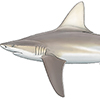
The most common large shark of the Virginia region. Chesapeake Bay is one of its most important nursery grounds in the western Atlantic.

Learn more about these and other local shark species here.
All shark illustrations © Marc Dando
The most common large shark of the Virginia region. Chesapeake Bay is one of its most important nursery grounds in the western Atlantic.

A common to abundant seasonal visitor in summer and fall to lower Chesapeake Bay.

The Atlantic sharpnose is a year-round resident of the South Carolina and Florida coasts, as well as the Gulf of Mexico.

Heavy fishing pressure on this species has reduced its numbers alarmingly. lt is now only a rare event to see a dusky shark in the Virginia region.

Migrates north seasonally as far as Cape Cod and is common year round in the Southeast U.S.
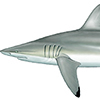
Known to form schools and often makes vertical spinning leaps through schools of fish and out of the water.

These fish arrive in Virginia coastal waters in June, and migrate south along the coast from August to October.

Uncommon visitors to lower Chesapeake Bay and adjacent coastal waters in summer and fall.
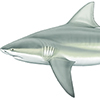
Bull sharks are uncommon in Chesapeake Bay and other Virginia waters.

Occasional visitors to Virginia waters and are usually found at least 10-20 miles offshore.

Migrates north seasonally as far as Cape Cod and is common year round in the Southeast U.S.
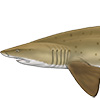
Large, slow-moving sand tiger sharks are commonly found inshore occupying bottom habitats in Virginia in the summer months.

Is uncommon in the Southeast United States, but migrates north seasonally in summer.
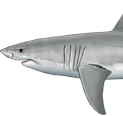
Relatively uncommon shark frequenting cold and warm temperate seas, larger individuals penetrate warmer ocean water.